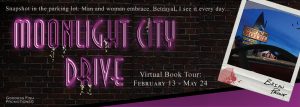
GENRE: Crime/Thriller Romantic Paranormal
~~~~~~~~~~~~~
BLURB:
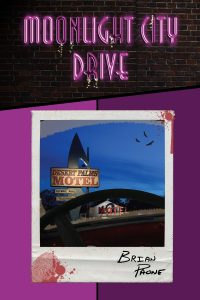
11:18 p.m. Subject is checking into the Desert Palms Motel, accompanied by an unknown female.
Snapshot in the parking lot. Man and woman embrace. Betrayal, I see it every day, like my own reflection in the mirror staring back at me. Another case, another bottle of booze, life is no longer a mystery to me …
… Because I’m the private eye, hot on your trail; the top gun for hire. You’ll find me lurking in the shadows, always searching for a clue. I’m the bulletproof detective. I got my eye on you …
What’s a little sin under the covers, what’s a little blood between lovers? What’s a little death to be discovered, cold stiff body under the covers?
I’m digging you a desert grave, underneath the burning sun. You won’t be found by anyone. Vultures circle in the sky, and you, my dear, are the reason why.
… I was always easily influenced.
EXCERPT:
Smith twisted the key as hard as he could and heard a popping noise as the locking mechanism finally gave way. He pushed open his office door and entered the dark room. He tossed his keys onto his desk; they slid a short distance before a stack of time-faded papers and case-file folders abruptly stopped them.
Flicking the light switch, the room illuminated with an anemic-brown glow from the single dusty bulb. He took a step toward the coffee percolator on the windowsill, and his toe caught the corner of a tied-up pile of newspapers dating back at least ten years.
Smith exhaled loudly with a frustrated grunt and kneeled beside the newspaper bundle; the air escaping from his lungs carried the stench of day-old consumed alcohol, topped off with more last night that led to closing time this morning. He really hadn’t slept. He napped for a couple hours, then came here. He removed the Swiss Army knife from his pants and cut the twine, freeing the newspapers, watching as they avalanched to the floor.
He used his palm to shuffle and smear the newspapers around his office floor. His gaze quickly scanned his name plastered on all the headlines, praising the ex-deputy-now-turned-private-eye for all the scum he had gotten off the street, as well as locating abducted kids, reuniting long-lost biological parents of orphans, and exposing spouses who may have forgotten their vows. Smith had seen more than he cared to remember while he had been a sheriff’s deputy and could now safely check the box marked Seen It All since becoming a private eye.
GUEST POST:
I’ve published 4 novels, and my typical day during the writing of each book was totally different from each other.
When I was writing my first book, Dreams Are Unfinished Thoughts, I was in the middle of moving from MA to GA, changing police departments, and recording an album with my band, Transpose. So, a typical day would be: getting everything done first for the move, switching jobs, the recording studio, and whatever time was left at night: working on the book. We also didn’t have any kids yet.
With my second novel, Welcome to Parkview, my wife had been deployed to Djibouti and I was working full time at the police department in GA, and we had 2 kids now. So, I was alone without my wife, with 2 toddlers, and working full time. My day would be: getting the kids to day-care, go work fighting crime for 8 hours, picking the kids up and doing whatever household chores I had to do (laundry, cleaning, grocery shopping etc.), feeding the kids dinner and putting them to bed around 6:30, then I would work out for an hour, and then I would work on Welcome to Parkview after I showered until whenever I passed out at my laptop.
With my third novel, Yours Truly. 2095, the Navy had sent us to Japan for the next 4 years. I had to take a leave of absence at the police department, and we moved the family there. I did not get a job right away, as my wife wanted me to be the stay at home parent during our time in Japan (I did eventually become a Criminal Justice professor for the college on base, but that’s irrelevant to the book.) We moved in November 2011 and by January 2012 I was itching to write. For the first time, I had the TIME to write, and not having to worry about a new job, moving, or wiping poopy diapers. So, in February 2012, I started my outline, and writing the book was my full-time job for a while. We sent our 2 kids to Japanese Kindergarten (called a Yochien in Japan) and they were gone Monday through Friday from 9:00 to 4:00. I would bring them to the bus stop, wave goodbye, go back up into our apartment, and write until the bus brought them back. It was the first time I could write without distractions, and the first time I was writing not being dead-tired at night after putting in a full day.
Moonlight City Drive was the first book where I had a legit writing office. When we moved from Japan to North Carolina, one of the stipulations my wife had on finding a new house was that it would have a writing office for me. One with doors. And a writing desk. And I could decorate it any way I wanted. So this new novel was written, for the first time, in a closed-off environment from the distractions of the outside world (and that includes the kids, TV, and normal household noise.) So, it’s not surprising that out of my 4 novels, this one was completely the quickest from inception to publication. When I was in my office writing, my wife treated it like a job, so she made sure the kids stayed away from me and other household chores were taken care of so I wouldn’t be bothered. I did go back to work as a police officer in NC, so my days off from the streets were my days on writing the book.
AUTHOR BIO:
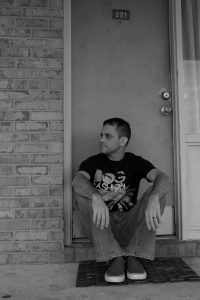
Brian Paone was born and raised in the Salem, Massachusetts area. Brian has, thus far, published four novels: a memoir about being friends with a drug-addicted rock star, Dreams are Unfinished Thoughts; a macabre cerebral-horror novel, Welcome to Parkview; a time-travel romance novel, Yours Truly, 2095, (which was nominated for a Hugo Award, though it did not make the finalists); and a supernatural, crime-noir detective novel, Moonlight City Drive. Along with his four novels, Brian has published three short stories: “Outside of Heaven,” which is featured in the anthology, A Matter of Words; “The Whaler’s Dues,” which is featured in the anthology, A Journey of Words; and “Anesthetize (or A Dream Played in Reverse on Piano Keys),” which is featured in the anthology, A Haunting of Words. Brian is also a vocalist and has released seven albums with his four bands: Yellow #1, Drop Kick Jesus, The Grave Machine, and Transpose. He is married to a US Naval Officer, and they have four children. Brian is also a police officer and has been working in law enforcement since 2002. He is a self-proclaimed roller coaster junkie, a New England Patriots fanatic, and his favorite color is burnt orange.
Purchase Moonlight City Drive at Amazon or B&N.
CONNECT WITH BRIAN:
www.BrianPaone.com
Facebook
Amazon
Goodreads
Twitter
Facebook–Scout Media
Scout Media
Brian offers readers a chance to win a $50 Amazon/BN.com gift card:
a Rafflecopter giveaway
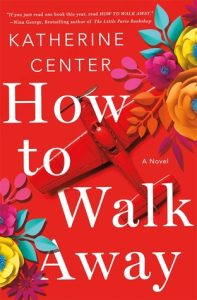
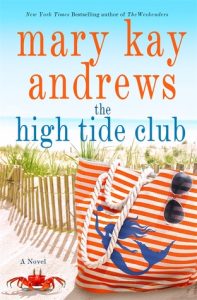 Brooke Trapnell, the runaway bride in Save the Date, continues her story, having moved back to little town, Georgia, with her son, Henry. The resident wealthy socialite philanthropist of nearby Sea Island, Josephine Bettendorf Warrick, contacts Brooke to represent her against the state of Georgia, who wants her land for a state park. The secrets of nonagenarian Josephine slowly seep out as she lays out her plans to atone for her sins and defend her estate by passing it on to descendants of her long ago best friends. Brooke discovers a related family secret she would have never thought to guess.
Brooke Trapnell, the runaway bride in Save the Date, continues her story, having moved back to little town, Georgia, with her son, Henry. The resident wealthy socialite philanthropist of nearby Sea Island, Josephine Bettendorf Warrick, contacts Brooke to represent her against the state of Georgia, who wants her land for a state park. The secrets of nonagenarian Josephine slowly seep out as she lays out her plans to atone for her sins and defend her estate by passing it on to descendants of her long ago best friends. Brooke discovers a related family secret she would have never thought to guess.


 Steve Carr’s first collection of short stories is fantastic. His work is intense, reaching into the reader’s head and twisting emotions, shattering logic and reason. The first story Tenderloin is—pun intended—a punch in the gut, as the reader sees the grittiness of the setting and feels the coiled tension in the main character, a veteran of the Iraq War. With journalistic expertise, Carr displays monstrous humanity in a brevity of words, as in The Saguaro Two Step, in which the woman wins the loot in the end, and exposes desperation, as in The Festival of The Cull, wherein Shamina can no longer vote on who is to be terminated. Reality bends as one ventures further into the book, as in the self-explanatory The Girl in a Mason Jar, gets fishy in Strange Water, and disappears in When Wizards Sing, where animals and men blend. The stories are diverse, with main characters of various genders, sexual orientations, ages, cultures, and even species. The book ends with stories of the afterlife on a never-ending train ride for incorrigibles, a man’s struggle for gravity, and the misplaced hope of a senior citizen. Definitely a must-read! Follow Steve on
Steve Carr’s first collection of short stories is fantastic. His work is intense, reaching into the reader’s head and twisting emotions, shattering logic and reason. The first story Tenderloin is—pun intended—a punch in the gut, as the reader sees the grittiness of the setting and feels the coiled tension in the main character, a veteran of the Iraq War. With journalistic expertise, Carr displays monstrous humanity in a brevity of words, as in The Saguaro Two Step, in which the woman wins the loot in the end, and exposes desperation, as in The Festival of The Cull, wherein Shamina can no longer vote on who is to be terminated. Reality bends as one ventures further into the book, as in the self-explanatory The Girl in a Mason Jar, gets fishy in Strange Water, and disappears in When Wizards Sing, where animals and men blend. The stories are diverse, with main characters of various genders, sexual orientations, ages, cultures, and even species. The book ends with stories of the afterlife on a never-ending train ride for incorrigibles, a man’s struggle for gravity, and the misplaced hope of a senior citizen. Definitely a must-read! Follow Steve on 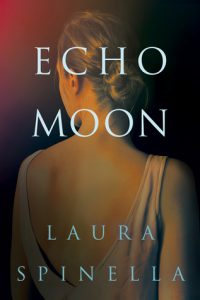 Echo Moon finishes the Ghost Gifts trilogy, beginning with Aubrey and her souvenirs from ghosts she helps that she calls “ghost gifts,” through her marriage to journalist Levi St. John, to their son’s story of his past life, wherein he envisions shooting his true love Esmerelda Moon—Esme. Spinella pulls the reader into an early 20th-century culture of supper clubs and amusement parks, showcasing Luna Park of Coney Island, with its rides, performers and customers. We even witness the shadier “rides,” “performers,” and “customers” of the Elephant Hotel, a brothel set on the edge of the park. The hotel is real, but turned brothel after the heyday of the family-oriented park, and pulls Spinella’s story into the historical fiction genre as she carefully blends it into her novel.
Echo Moon finishes the Ghost Gifts trilogy, beginning with Aubrey and her souvenirs from ghosts she helps that she calls “ghost gifts,” through her marriage to journalist Levi St. John, to their son’s story of his past life, wherein he envisions shooting his true love Esmerelda Moon—Esme. Spinella pulls the reader into an early 20th-century culture of supper clubs and amusement parks, showcasing Luna Park of Coney Island, with its rides, performers and customers. We even witness the shadier “rides,” “performers,” and “customers” of the Elephant Hotel, a brothel set on the edge of the park. The hotel is real, but turned brothel after the heyday of the family-oriented park, and pulls Spinella’s story into the historical fiction genre as she carefully blends it into her novel.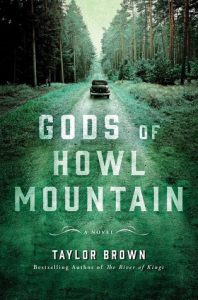
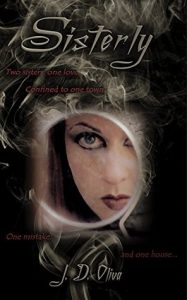
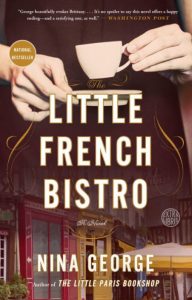 Finding Femininity and Feminism in France
Finding Femininity and Feminism in France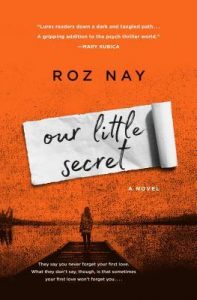 This story opens in an interrogation room, with Angela prepared to tell her story to police, if they will only listen. Finally, Detective Novak allows her to share everything that she feels is relevant, beginning with her meeting H.P. in high school, where he changed her life. They became best friends who fell in love, or as Angela tells the story, soul mates. She leads Detective Novak through their complicated relationship, hampered by her lack of a healthy role model and his small town contentment, and further strained by Angela attending Oxford, where she’s befriended by Freddy, who dotes on her against her will. Detective Novak perks up at the entrance of Saskia, the missing wife, the reason for Angela’s interrogation, during H.P.’s visit to England. Misunderstandings ensue, emotions tangle, and new pathways are formed. Angela blames losing her first love on everyone else, spending her life from that point on waiting for him to do the right thing. When her mother moves in uninvited after leaving her father, she pursues an unhealthy friendship with H.P. as their houseguest and babysitter, which culminates in Saskia’s disappearance. Detective Novak pieces together the evidence through the long night of storytelling by Angela, who is either also an innocent victim or a truly unreliable narrator.
This story opens in an interrogation room, with Angela prepared to tell her story to police, if they will only listen. Finally, Detective Novak allows her to share everything that she feels is relevant, beginning with her meeting H.P. in high school, where he changed her life. They became best friends who fell in love, or as Angela tells the story, soul mates. She leads Detective Novak through their complicated relationship, hampered by her lack of a healthy role model and his small town contentment, and further strained by Angela attending Oxford, where she’s befriended by Freddy, who dotes on her against her will. Detective Novak perks up at the entrance of Saskia, the missing wife, the reason for Angela’s interrogation, during H.P.’s visit to England. Misunderstandings ensue, emotions tangle, and new pathways are formed. Angela blames losing her first love on everyone else, spending her life from that point on waiting for him to do the right thing. When her mother moves in uninvited after leaving her father, she pursues an unhealthy friendship with H.P. as their houseguest and babysitter, which culminates in Saskia’s disappearance. Detective Novak pieces together the evidence through the long night of storytelling by Angela, who is either also an innocent victim or a truly unreliable narrator.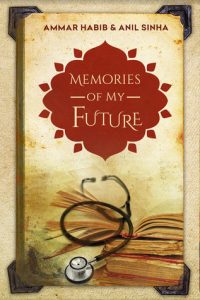 Surgeon Avinash Singh loses a child during surgery to heart failure caused by a new virus. Having accepted always being the best at everything he does, this harsh reality devastates him. His nurse Martha, a second mother in his adopted country, tells him to find a way to deal with it and get back to work. He seeks resolution in the journal of his ancestry given to him by his grandfather. He reads of Khau, the Lion of Bihar, a 13th-century warrior ancestor, who must find a way to save Bihar from the Mongols. Those barbarians destroy everything in their path, because they are unbeatable archers on horseback. Khau determines their weakness and defeats them. The inspirational story motivates Avinash to develop a cure. From this breakthrough, Avinash receives two offers: a position at a coveted medical center in NYC and a chance to offer his skills to a humanitarian effort. He returns to the journal to learn about Veeresh, the leader of his people who did not break under torture by the East India Company’s best “negotiator.” From this lesson, Avi knows he must follow his heart. On this path, he finds true love and faces a challenge that calls out to his warrior blood.
Surgeon Avinash Singh loses a child during surgery to heart failure caused by a new virus. Having accepted always being the best at everything he does, this harsh reality devastates him. His nurse Martha, a second mother in his adopted country, tells him to find a way to deal with it and get back to work. He seeks resolution in the journal of his ancestry given to him by his grandfather. He reads of Khau, the Lion of Bihar, a 13th-century warrior ancestor, who must find a way to save Bihar from the Mongols. Those barbarians destroy everything in their path, because they are unbeatable archers on horseback. Khau determines their weakness and defeats them. The inspirational story motivates Avinash to develop a cure. From this breakthrough, Avinash receives two offers: a position at a coveted medical center in NYC and a chance to offer his skills to a humanitarian effort. He returns to the journal to learn about Veeresh, the leader of his people who did not break under torture by the East India Company’s best “negotiator.” From this lesson, Avi knows he must follow his heart. On this path, he finds true love and faces a challenge that calls out to his warrior blood.